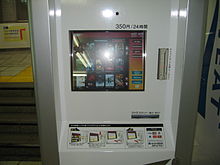- Rental shop
-
A rental shop, also known as a video library, is a business that allows a consumer to temporarily obtain a reusable good or product for a specified period of time in exchange for payment, a process known as renting. Typically, a rental shop will conduct business with customers under conditions and terms agreed upon in a rental agreement or contract, which may be implied, explicit, or written.
Contents
Overview
Typically, a customer must sign up for an account with the shop and give billing information like a credit card number. If items are returned late, the shop usually charges late fees, which typically accumulate day by day. Some shops now have policies where instead of late fees, they will treat overdue items as a sale after a certain date, and charge a price equivalent to a standard sale of that object (with appropriate deductions for the rental fee already paid and for its pre-opened condition).
The most common type of rental shop are video rental outlets, offering primarily movies. Many such rental shops also offer music or computer games as well. Some video rental outlets use a kiosk or vending machine to dispense and collect rentals. Other types of rental shops include car and truck rentals, construction and heavy equipment rentals, sporting goods and recreational rentals, television and domestic appliance rentals, and customer rentals.
In 2010, a report indicated that in the United States, public libraries collectively loaned more videos than the online rental outlet Netflix.[1]
Rental and copyright
The rental of books, CDs and movies is covered by copyright law[citation needed]. Copyright owners sometimes put warning notices on the packaging of products such as Blu-ray Discs or DVDs to deter copyright infringement. In some cases, the rights of consumers in Europe and the US are in fact significantly broader than described in such warnings.
Blu-ray Disc, DVD, and VHS rental
There would typically be a two- to three-month delay between the time a movie was available for rental, and when the movie could be purchased by the consumer. (In reality, the video was available, but priced for rental shops and film enthusiasts who wanted to own a copy of the film at the earliest opportunity. The pricing was between $70 and $130). This started changing with the advent of movie releases on DVD. Blockbuster video refused to use the VHS strategy for DVD, so the studios began releasing DVDs at an initially lower price. During 1998, retailers would have the DVD version of a film available for sale the same day the VHS version was available for rent. This later changed, with release dates for VHS and DVD coinciding. In 2008, this also occurred when the Blu-ray Disc format was introduced as the successor to DVD. A movie will be available on Blu-ray and DVD on the same day.
In some rentals the boxes are on the shelves, but the actual media (Blu-ray Disc, DVD, or video game disc) is kept behind the desk, therefore reducing any risks of theft (since the most someone can steal from the shelves is the box). The media is put into the box at the same time that the rent is signed. Or the case may be locked and can only be unlocked with a special instrument kept behind the video shop counter.
In some countries, a vending machine and a credit card are employed by the user to rent the Blu-ray Disc or DVD.
See also
References
External links
- "Video stores still making a go at attracting business (answer poll)." Gaston Gazette. September 24, 2010.
- Dawson, Jennifer. "The incredible shrinking video stores!" Houston Business Journal. Friday April 21, 2006.
Wikimedia Foundation. 2010.

